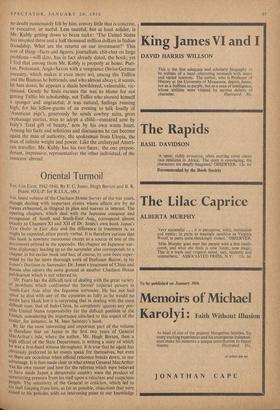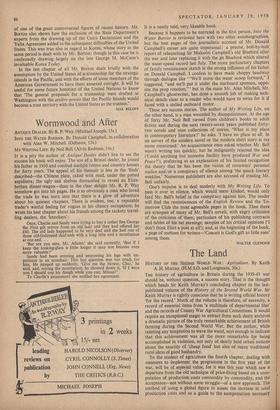Oriental Turmoil
Tut:, FAtt Emir, 1942-1946. By F. C. Jones, Hugh Burton and B. IC ' Yearn. (O.U.P. for R.1.I.A., 60s.) l tut, latest volume of the Chatham House Survey of the war years, though dealing with important events whose effects arc by no means exhausted, is illogical in plan and uneven in interest. The opening chapters, which deal with the Japanese conquest and occupation of South and South-East Asia, correspond almost exactly to Chapters'XI and XII of Dr. Jones's own book Japan's New Order in East Asia and the difference in treatment is, as might be expected, often purely verbal. It is therefore curious that this book is nowhere mentioned except as a source of One of the documents printed in the appendix. His chapter on Japanese war- Mite diplomacy leading up to the surrender also corresponds to a chapter in his earlier book and has, of course, by pow been super- seded by the far more thorough work of Professor Butow, in his Japan's' Decision to Surrender. Dr. Jones's treatment of China and Russia also covers the same ground as another Chatham House Publication which is not referred to.
Mr. I'carn has the difficult task of dealing with.the great variety or problems which confronted the former imperial powers in South-L,Iust Asia after the Japanese surrender. He has not had space to deal with any of the countries as fully as he would no doubt have liked, but it is surprising that in dealing with the most difficult case, that of Indo-China, he completely ignores any pos- sible United States responsibility for the difficult position of the French, considering the importance attached to this aspect of the matter, for instance, in M. Jean Sainteny's book.
By far the most interesting and important part of the volume is therefore that on Japan in the first two years of General MacArthur's rule, where the author, Mr. Hugh Borton, then a high official of the State Department, is writing a story of which he was a first-hand witness throughout. It is true that he again has obviously preferred to let events speak for themselves, but even so there are occasions when official reticence breaks down, to our advantage. It is thus made clear to what extent General MacArthur was his own master and how far the reforms which were believed to have made Japan a democratic country were the product of unremitting, pressure (from his staff upon a reluctant and suspicious Pe9Ple. The sensitivity of the General to criticism, which led to his stall keeping from him, as far as possible, objections that were raised to his policies, adds an interesting point to our knowledge
of one of the great controversial figures of recent history. Mr. Borton also shows how the exclusion of the State Department's experts from the drawing up of the Cairo Declaration and the Yalta Agreement added to the subsequent difficulties of the United States. This was true also in regard to Korea, whose story in the same period is dealt with by Mr. Borton; though in this case he is confessedly drawing largely on the late George M. McCune's invaluable Korea Today.
In the last chapter of all Mr. Borton deals briefly with the assumption by the United States of a trusteeship for the strategic islands in the Pacific, and with the efforts of some members of the American Government to have them annexed outright. It will be useful for some future historian of the United Nations to know that The general proposals for a trusteeship were drafted at Washington with the arriere-pensee that the Pacific Islands would become a trust territory with the United States as the trustees.'
MAX BELOFF



































 Previous page
Previous page